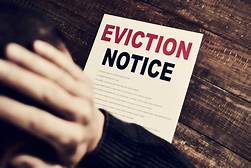 By: Albert Gutierrez
By: Albert Gutierrez
The eviction situation in Virginia is highly unsettling. In 2016, five of the top ten cities with the highest eviction rates were located in Virginia.[1] The list included cities such as, Richmond, Hampton, Newport News, Norfolk, and Chesapeake.[2] Richmond, in particular, was second in the nation, where roughly 1 in 9 renters faced eviction each year.[3] With eviction numbers skyrocketing throughout Virginia prior to the pandemic, the rise of unemployment numbers would very likely have had a detrimental impact on renters and eviction numbers. Fortunately throughout the pandemic, Virginia made conscious efforts to combat this problem and minimize damage due to the severe impact on financial stability for renters everywhere.
On August 26th. 2021 the Supreme Court struck down the CDC eviction moratorium, leaving a large amount of housing legislation into the hands of the states.[4] While this would be concerning for many states, Governor Ralph Northam has been actively working with the Supreme Court of Virginia and the General Assembly throughout the pandemic to enact additional protections for tenants.[5] This includes investments to continue the statewide Rent and Mortgage Relief Program (RMRP) through the Department of Housing and Community Development.[6] Since its dispatch, RMRP has processed over 16,000 rent payments and almost 530 mortgage payments.[7]
As part of these protections, in July, Virginia awarded a $3.5 million contract to Housing Opportunities Made Equal of Virginia and legal aid organizations across the state to lead outreach and provide application assistance for the program.[8] The hope is that this initiative reduces barriers, specifically for lower-income tenants, to navigate the program and secure the help they need.[9] Ralph Hodge, a pastor at 2nd Baptist Church on Broad Rock Boulevard in South Richmond and a past co-president of Richmonders Involved to Strengthen our Communities has lobbied for anti-eviction measures and affordable housing in the region.[10] Hodge said, “It’s not an issue of resources, it’s really an issue of access and ease of access,” He further stated. “That’s what’s been frustrating to me, I’ll tell people to call the [rent relief] number and they’ll wait for months even after they’ve submitted all their paperwork.” [11]
Starting October 1, 2021, Virginia’s newly enacted law continues to protect homeowners on the brink of eviction.[12] Specifically, eviction notices must now include three additional requirements: (1) information about federal housing services; (2) contact information about statewide legal aid; and (3) a statement reading, “This is NOT a notice to vacate the premises. You should consider contacting an attorney or your local legal aid or housing counseling agency.”[13]
This newly enacted piece of legislation in Virginia athwarts an eviction protection law implemented in the summer of 2021 that stated, “Landlords must provide 14-days of nonpayment notice before pursuing evictions (up from five).” [14]
On the verge of eviction, directing tenants to resources, aid, and assistance can further minimize the impacts of COVID-19, while also improving Virginia’s unfortunate housing situation. Full legal representation can decrease the likelihood of an eviction and mitigate negative impacts of evictions, in the event that they occur.[15] In Boston, two-thirds of fully represented clients retained possession of their homes compared to one-third of clients with limited legal assistance.[16] In New York City, tenants represented by attorneys were four times more likely to retain possession of their homes than those not represented.[17] Even with limited representation or mediation, eviction outcomes can still be slightly improved in certain situations.[18]
Therefore, this new piece of legislation can have positive impacts in directing tenants to seek help, as well as pointing them to the proper resources to find assistance. While this may not be a long-term, viable solution, this can temporarily mitigate the hardships tenants have and continue to endure during these unprecedented times.
[1] Initial Analysis and Recommendations to Reduce Evictions in Virginia, DHCD (2020).
[2] Id.
[3] Id.
[4] See Ram Eachambadi, US Supreme Court Strikes Down CDC Moratorium on Evictions, Jurist (Aug. 27, 2021), https://www.jurist.org/news/2021/08/scotus-strikes-eviction-moratorium/.
[5] Sydney Lake, Virginia Extends Rent, Mortgage Assistance Program as Pandemic Rent Freeze Ends, 13NewsNow (Jun. 29, 2020, upd. July 6, 2020), https://www.13newsnow.com/article/life/virginia-extends-rent-mortgage-assistance-program-as-pandemic-rent-freeze-ends/291-57dd76ee-cae3-481b-a815-63df37f93833
[6] Id.
[7] Simone McKenny, Virginia Mortgage Relief Program to Offer Housing Assistance Over the Pandemic, WHSV (Jan. 1, 2021), https://www.whsv.com/2021/01/01/virginia-mortgage-relief-program-to-offer-housing-assistance-over-the-pandemic/.
[8] Mark Robinson, What A New Federal Eviction Order Means for Virginia Renters, Richmond Times-Dispatch (Aug. 4, 2021), https://richmond.com/news/local/govt-and-politics/what-a-new-federal-eviction-order-means-for-virginia-renters/article_fa2af14e-ba96-5049-9872-12e702afcfb2.html.
[9] Id.
[10] Id.
[11] Id.
[12] See Skye Witley and Andrea Swalec, New Laws in DC, Maryland, and Virginia Take Effect Oct. 1, NBC Washington (Oct. 1, 2021), https://www.nbcwashington.com/news/local/new-laws-dc-maryland-virginia-oct-1-2021/2817155/.
[13] Id.
[14] See Skye Witley and Andrea Swalec, New Laws in DC, Maryland, and Virginia Take Effect Oct. 1, NBC Washington (Oct. 1, 2021), https://www.nbcwashington.com/news/local/new-laws-dc-maryland-virginia-oct-1-2021/2817155/.
[15] Initial Analysis and Recommendations to Reduce Evictions in Virginia, DHCD 6 (2020).
[16] Id.
[17] Id.
[18] Id.
